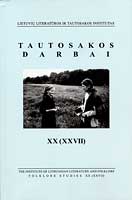Kas pirmesnis, tas geresnis: papročių teisės tekstas ir kontekstai
The first is the best: text and contexts in the common law
Author(s): Gražina KadžytėSubject(s): Customs / Folklore
Published by: Lietuvių literatūros ir tautosakos institutas
Keywords: The first; the best; common law; family customs; community
Summary/Abstract: Along with altering economic and social systems, customs and laws also changed. The common law, which used to be part of the social order, remained undocumented, just implicitly present in various subsequent law codes. Yet folklore texts do present some data for studying this kind of law: certain hints or allusions can be found in folk songs and folk tales, whereas much more abundant and varying argumentation is preserved in proverbs. Various aspects of the common law, their spread, longevity, change, causes of extinction or preservation can be traced back by examining separate thematic and semantic groups of proverbs, accumulated in the Lithuanian Folklore Archives, and comparing them with proverbs of other peoples. Proverbs analyzed in this article illustrate the principle of the common, or even natural, law: The first is the best. Not only various aspects of human relations support this maxim, but also laws of nature. There are abundant statements in the calendar customs, promoting specific behavior during certain important days of the year: i. e. one should be first getting up in the morning, first getting back home, or performing some important tasks, etc. In customs of the communal labor also special tribute is paid to the leaders, i. e. the best specialists of some kind of work, capable to lead others. Among the widespread types of European proverbs there is one, asserting that the person first arriving to the mill has the right of precedence to accomplish the job. Its variants can be found among French, Spanish, German, Latvian, Byelorussian, Estonian, Finnish proverbs, etc. English collections of proverbs list a more abstract statement: First come, first served. Nevertheless the Polish proverb Każdy lepsze ma prawo, kto jest perwszy w czasie represents a direct indication to the general legal principle, which, according to L. Czapiński, reflects a norm of the ancient Roman law: waif belonged to the one who found and claimed it first. Equivalents of this proverb are popular also among Russians and other Slavs. Family law even retained an evaluation of the successive marriages: The first husband (wife) is by God, the second – by people, the third – by the devil. Interesting linguistic context for this text is supplied by the “Lithuanian Language Dictionary”: special terms for naming the first, second and third spouse are listed there along with descriptions of mostly comical situations to illustrate them. Rights of primogeniture, rather often described in the Old and New Testament, also have a curious parallel among Lithuanian proverbs: The firstborn son – to the God, the firstborn pig – to the pastor. Its earliest interpretation would indicate an ancient social requirement to dedicate the firstborn son for God’s service, later – to service at the royal or duke’s court...
Journal: Tautosakos darbai
- Issue Year: 2004
- Issue No: 27
- Page Range: 51-58
- Page Count: 8
- Language: Lithuanian

